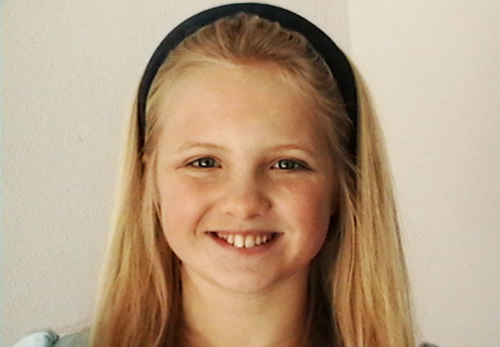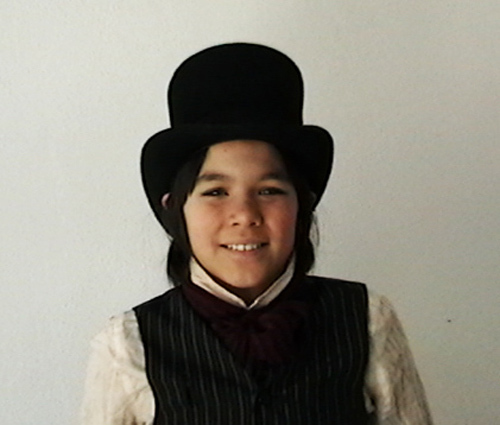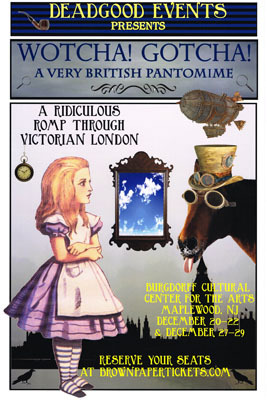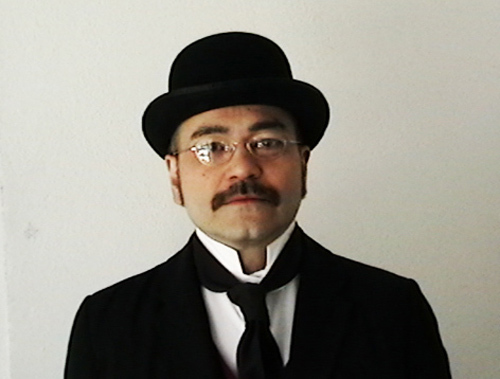"Alice in Wonderland is one of the earliest books written with the intention of entertaining children and not improving or educating them. It is still a breath of fresh air. I like to think that my version of Alice Liddell in Wotcha! Gotcha!, speaks and acts more like the Alice of the books than various other recent versions." -- Gareth Jones
Wotcha! Gotcha!, a very British style of pantomime (or panto), is all set to delight and entertain audiences at the Burgdorff Center for the Performing Arts in Maplewood, N.J., this week in a peculiarly British tradition of winter musical comedy theater. British panto has very deep roots dating back to 15th- and 16th-century Italian traditions of Commedia dell'Arte. It was my first introduction to theater, and even today it remains a form of entertainment that I am passionate about. "It's all about tradition," explains Edward Ash-Milby, who plays Charles Dodgson in the show. "And what finer way to spend each holiday than being with family and especially children, laughing at the charming silliness of a British pantomime."
Panto is designed for families, and it's designed to be a participatory form of theater, so if you're lucky enough to get to Wotcha! Gotcha!, be prepared to laugh and sing and cheer and boo and of course shout "wotcha!" an awful lot. The plot takes us back in time to the 64-year-long reign of Queen Victoria, during which an awful lot of incredible things happened. The show treats the whole period as a single point in time, mixing characters, events and all sorts of fascinating stuff together, including a whole extra world. Hence, Alice Liddell (the original inspiration for Alice in Wonderland), Charles Dodgson, Sherlock Holmes, Oliver Twist, and others find themselves through the looking glass in a wide and wonderful world of dirigibles, giant steam-driven mechanical warriors, a hat with a telescope and a teapot. "There's lots of action," explains Wyatt Ash-Milby, who plays the Artful Dodger, "but I had the most fun speaking in a Cockney accent."
I had the opportunity to chat with producer/writer Gareth Jones about the production and the very popular British tradition of pantomime.
"Watching the play come to life in the hands of some very impressive actors has been a joyful experience. The contrast between the speech and manners of the street urchins and the well-educated characters is one of the driving engines of the show." -- Gareth Jones
C. M. Rubin: Gareth, why is pantomime important?
Gareth Jones: In the UK most of the adults who enjoy live theater started with pantos as a kid. They are the best-attended shows every year, and they help keep theaters open. When I go to live theater in the U.S., there's usually a sea of grey heads for an audience. Nothing wrong with being older -- I'm pretty old myself -- but it's lovely to give a new generation a love of real, live, in-your-face entertainment. And for the adults too, panto is quite unlike most other theatrical forms. It keeps alive an old and worthy tradition. But forget all that and listen to what Mrs. Hudson says in Wotcha! Gotcha!: "I'll tell you what: Ignore everything else we've all said about panto. Just remember that last bit: Enjoy yourselves! We most definitely shall."
"It's lovely to give a new generation a love of real, live, in-your-face entertainment. Panto is quite unlike most other theatrical forms. It keeps alive an old and worthy tradition." -- Gareth Jones
Rubin: Tell me about some of your favorite characters and events in Wotcha! Gotcha!
Jones: The Victorian years gave us so much of our great literature: Dickens, Arthur Conan Doyle, Kipling, Robert Louis Stevenson, Bram Stoker, Wilkie Collins, H. G. Wells, and many more. The cinema today is still crowded with stories from that era, from Sherlock Holmes to War of the Worlds. And of course there's Alice. Alice in Wonderland is one of the earliest books written with the intention of entertaining children and not improving or educating them. It is still a breath of fresh air. I like to think that my version of Alice Liddell in Wotcha! Gotcha! speaks and acts more like the Alice of the books than various other recent versions. Alice Liddell is polite and respectful but by no means a pushover. She is strong and resourceful, and I'm pretty sure that if I hadn't had her rescued from the clutches of the evil Mad Hatter by Wiggins, the Artful Dodger, Prince Leopold, Charles Dodgson, and Dr. Watson (along with a bunch of others), she'd have come out the winner anyway. Dodgson himself is a devoted fan of hers, and in an attempt to rescue her from the mirror world, he tries to recruit Sherlock Holmes. Unfortunately, he ends up with Sherlock's incompetent cousin Shamrock. Dodgson carries himself with a sort of amused dignity at all times, and his scene with Professor Moriarty as they swap scientific expertise between the worlds is one of my favorite parts.
Watching the play come to life in the hands of some very impressive actors has been a joyful experience. The contrast between the speech and manners of the street urchins and the well-educated characters is one of the driving engines of the show.
Another one of my favorite parts is our visit to the Victorian Music Hall, with its Floccinaucinihilipilificative master of ceremonies, the comedy routine of the GerBlimey Bruvvers (some of the youngest actors in the show), and my own brief appearance as Zingo the magician.
"What finer way to spend each holiday than being with family and especially children, laughing at the charming silliness of a British pantomime." -- Edward Ash-Milby
Rubin: So, Gareth, the million-dollar question: Will pantomime catch on in the U.S.?
Jones: My answer to this, based on our experience so far, is a resounding "yes!" The audience absolutely laps up the anarchic, noisy nonsense that is the heart of the art form. And the adults love joining in just as much as the kids do. Panto is very interactive.
To me it seems obvious that we should have new themes for the stories, and not (as in the UK) endless versions of a small number of stories. Most of these stories have been the subject of Disney movies, and when you mention Snow White, for instance, or Aladdin, to Americans, they already have a very clear (and Disneyesque) vision of the story in their head. I think this works against the enjoyment, and that's why I've broken new ground with my own pantos.
Rubin: What do you hope panto first timers will take away from Wotcha! Gotcha!?
Jones: My best answer for this is simply "enjoyment." One of the finest compliments I've ever received was after last year's show. My wife asked a youngster if he'd enjoyed the show. He said, "Whoever wrote that show knows a lot about fun!" I think, after watching the show, so does the audience.
---
For more info on Wotcha! Gotcha! visit brownpapertickets.com/event/508445 and deadgoodllc.com.
C. M. Rubin and Gareth Jones
All photos are courtesy of Deadgood Events LLC.
Visit the Alice Community Page here.
C. M. Rubin is the author of two widely read online series for which she received a 2011 Upton Sinclair award: "The Global Search for Education" and "How Will We Read?" She is also the author of three bestselling books, including The Real Alice in Wonderland.





